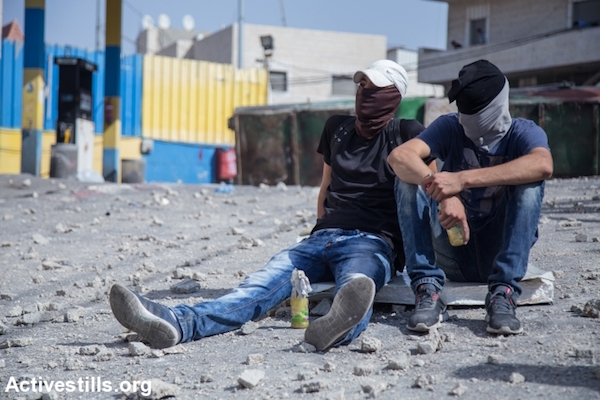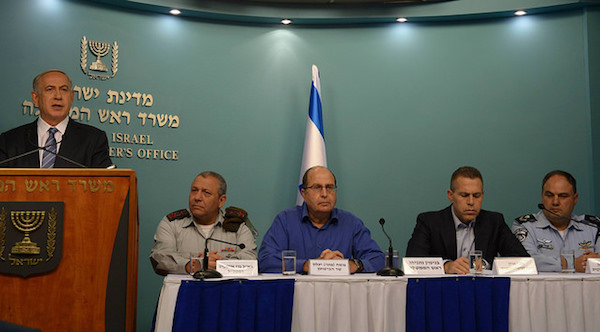The relative quiet on the ground in recent years, enforced by the Palestinian Authority on Israel’s behalf, led Israelis to believe they can enjoy peace and prosperity without ending the occupation.

Thirteen years passed between the First Intifada, which broke out in December 1987, and the start of the second in October 2000. Both intifadas lasted for roughly five years. It has been 15 years since the start of the Second Intifada, and 10 years since it ended.
If history and experience teach us anything, the timeframe is exactly right for the arrival of a new generation of young Palestinians who are willing to confront Israel — like their big brothers did, and before them, their parents. That theory also holds if you look at the profile of those carrying out the stabbing attacks and those taking part in demonstrations in recent days — mostly people under the age of 20.
The events of the past few weeks are not an intifada. Attacks and demonstrations against Israeli symbols and targets, civilian and military alike, have taken place since the 1970s with varying frequency. The intifadas, on the other hand, were characterized by an uprising that saw an almost across-the-board mobilization of the whole of Palestinian society and its institutions (although the Second Intifada quickly became an armed struggle carried out by a relatively small number of militants).
The current situation is different. Even Netanyahu has been forced to admit that the Palestinian Authority is not taking part in the current unrest. Things are centered in East Jerusalem, which is under direct Israeli control, and not in the West Bank. That also demonstrates why Israel will do everything it can to prevent the collapse of the PA, thereby preventing a return to the pre-Oslo situation, something for which a number of demagogues on the Israeli Right are calling. The PA, as Israel’s security contractor, is far more efficient at maintaining the peace than the Shin Bet or IDF ever were. Israel will dispose of it only when it completely stops performing its role.

The PLO’s international strategy has collapsed
The PA is an unusual institution. A massive part of its budget — 25 percent, it is said — is dedicated to security. Not securing Palestinians but rather securing Israelis. Palestinian police officers are forbidden from protecting Palestinian villagers against settler attacks. They need to call the Israeli police for that.
Over the past decade the Palestinian Authority took upon itself the role of Israel’s operations contractor of the occupation, with an understanding that quiet in the West Bank would create the requisite conditions for progress in peace talks with Israel. That’s what the Palestinians have always been promised, at least — if the violence stops, we’ll talk and you’ll get your state.
But it’s now clear that the dynamic is the exact opposite. The calm on the ground made Israelis believe that they can enjoy peace and prosperity without ending the occupation. The tragic paradox is that it was the intifadas that led to Israeli concessions (Oslo, the Gaza Disengagement), while the peaceful years resulted in more hardline Israeli positions and the expansion of settlements. In weeks like this one, it is sad to recall the commotion Netanyahu raised with his demands that the Palestinians recognize Israel as a “Jewish state,” and not just as “The State of Israel,” as if Israel needs Abbas to define its identity. Be sure that if Abbas had recognized Israel as a Jewish state, Netanyahu would have invented something new to demand. Anything in order to not reach an agreement.
When the PLO leadership understood that it wasn’t going to get anywhere with Israel, it took a gamble by seeking international pressure — first from the United states and then from Europe. The thing is, Washington will never seriously pressure Israel. If one compares America’s commitment to the Iran deal to its flaccid approach to the Palestinian issue, things come into focus rather quickly. The Iran deal was a matter of American interests for the Obama administration. The Israeli-Palestinian conflict was little more than an irritation.
Dramatic developments in the Arab world, particularly in Syria, are the final nails in the coffin of Palestine’s international strategy. Syria has gone from an Iranian-Turkish-Saudi proxy war to an American-Russian one, with massive consequences for the entire region and beyond — and as if that weren’t enough, the Americans are now worried about the stability of Jordan. Under these conditions, Israel’s strategy of strengthening and maintaining the status quo in the occupied territories suddenly seams reasonable to the United States. Hillary Clinton, who is still considered the Democratic frontrunner, said last week that Israeli-Palestinian conflict will probably have to wait, and it’s clear that no Republican candidate would even ponder putting pressure on Israel to end the occupation. The PLO’s international strategy completely collapsed this year, and Abbas never had a plan B.

A one-party conflict
I don’t know how much the Palestinian youngsters protesting in the West Bank and East Jerusalem think or care about broad geo-political considerations. What’s absolutely clear is that over the past couple of years diplomatic developments have evoked nothing but utter despondency in the occupied territories. That is something I’ve heard from every single Palestinian with whom I’ve spoken — an inability to even imagine what theoretic chain of events might one day bring about the end of the occupation. Under these circumstances, some hold to their daily lives in Ramallah or Jenin, which recovered a bit in the past decade, while others are willing to take desperate measures.
Israelis love to talk about “incitement” in the occupied territories. It provides a comforting explanation for the violence that breaks out now and again. Israel’s sense of righteousness is only reinforced by the feeling that Palestinians support violence, and that the Israeli side only wants peace and quiet — a little bit of normalcy, commerce, removing a few checkpoints here and there as signs of goodwill, etc.
But the situation, of course, is entirely different. The Palestinians are always subject to the violence of the occupation, which is daily as it is arbitrary, while Israelis primarily enjoy quiet and prosperity. The “Israeli-Palestinian conflict,” most of the time, exists for one side and one side only.
The Palestinians are prisoners in their own land. They cannot move around freely, they cannot enter and exit their country. Receiving visitors is dependent on the goodwill of the Israeli military regime. The same goes for keeping roads open and building new neighborhoods and even individual homes. They are entirely dependent on the goodwill of Israel for protection against attacks by Jews, and the Israeli army has never viewed protecting the Palestinian population as part of its mission in controlling the Palestinian territories. They are judged in Israeli military courts, they can be imprisoned without charge or trial, and on and on. And of course, they have no political rights like voting or political representation.
Politics has always been a substitute for violence in managing relations between various populations, and those who have no right to participate in politics quickly reach the conclusion that they have nothing but violence at their disposal. Even if every last social media post against Israel, the Jews or the Zionists was deleted from the Internet, the violence would still continue. Likewise, even completely dismantling every single organ and network of Hamas would not stop the organization from sprouting right back up, time and again.
We have to remind ourselves over and over and over again: the occupation is the ultimate terrorist infrastructure. One must be especially blind to think that extreme inequality and more than half a century of oppression could bring about any other result. We also needn’t delude ourselves about the reverse: ending the occupation may not bring peace, certainly not in the short term, but continuing it will definitely lead to a civil war, of which we’ve gotten a small taste this week. True, it’s not Syria or Yugoslavia. Not even close. But even Syria and Yugoslavia weren’t Syria and Yugoslavia until they were, either. The situation in Israel — two mixed populations that have zero-sum outlooks, and in which one side has all the power and the rights and the other has only crumbs — is the fundamental problem.
In that context, the most worrying phenomenon this week has been the spontaneous violence by regular citizens on both sides. Part of the reason for that is that both sides are exposed only to the terror wrought by the other. Jews saw the video of Adelle Bennett screaming for help and receiving only ridicule from shopkeepers in East Jerusalem. Arabs saw the mob chasing Fadi Alloun — one of the alleged Jerusalem stabbers — until police executed him in cold blood. Maybe that’s another explanation for the young age of the stabbers: they are the ones who are most exposed to social media, where all of the videos and reports are circulating.
Quiet comes with a price
The bad news is two-fold. Firstly, it is much more difficult to reach political solutions in the absence of central power structures. Secondly, in previous rounds it took four to five years of reciprocal bloodletting — during which Israel paid a heavy price, and the Palestinians several times that — until there formed an Israeli consensus that was willing to consider real concessions (Oslo and the Gaza Disengagement). There is no prospect for a temporary or permanent solution at the moment. There is no public support and there are no politicians to lead us in that direction.
Opposition leader Isaac Herzog this week demanded that the government put the entire occupied territories under siege. Collective punishment that would not bring us a meter closer to any solution, military or diplomatic. Minister Naftali Bennett proposed establishing new West Bank settlements. Former foreign minister Avigdor Liberman called on the public to take revenge on Arabs. Yair Lapid proposed activating a “lawnmower” policy (god only knows what that means), and expressed support for Jewish settlers living in Arab neighborhoods of East Jerusalem. Netanyahu looks like the most rational and cool-headed among all those who want to dethrone him, but it’s clear that he’s not going to be the one who leads us to a major breakthrough.
And yet, there is no way to justify for the feeling of helplessness and victimhood with which the streets of Israel are lined at the moment. Our current situation is not a “tragedy,” but rather a reality that elected Israel’s political leadership, with the backing of the vast majority of Jewish voters, marched directly into with eyes wide open.
The cards are still in Israel’s hands, and they hold great power. Israel can initiate new peace talks with a few simple gestures. It can even decide with whom: Fatah or a Palestinian unity government. It can rally an international coalition to support it — from the Arab states to Turkey, Russia, the United States and the European Union. Ours is one of the few issues in the world on which all of those states would happily cooperate. It could unilaterally end its military regime in the West Bank. In a nutshell, Israel has a full set of tools at its disposal that, in the medium- to long-term, could fundamentally alter relations between Jews and Arabs in this land. But doing so carries a price: putting an end to settlement building, releasing prisoners, and all of the rest of the steps that not only the political leadership, but also the majority of the Jewish public, rejects out of hand at the moment.
A version of this article first appeared in Hebrew on Local Call. Read it here.

